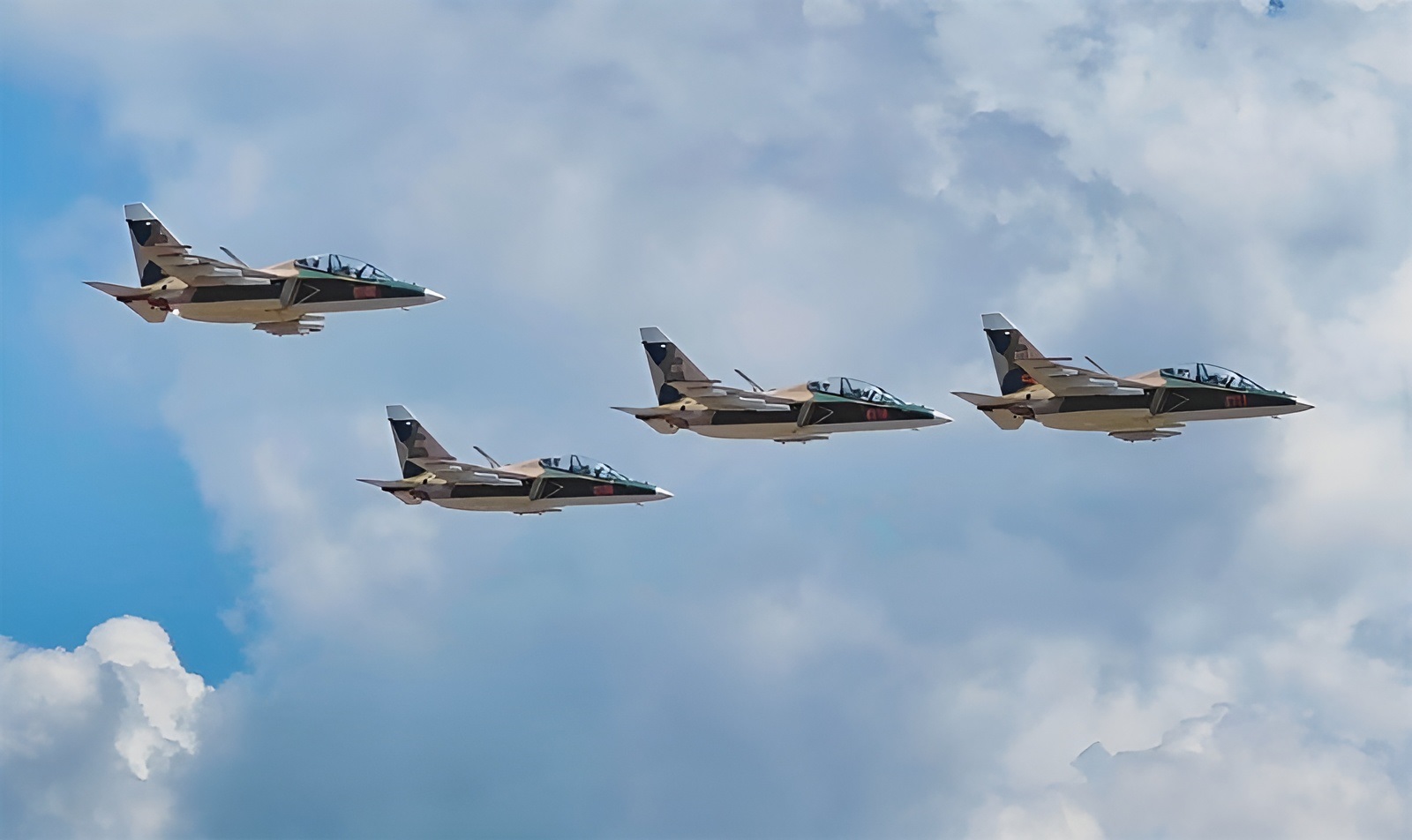The Vietnam People’s Air Force (VPAF) 940th Regiment, operating under the Air Force Officer Candidate School, is currently in the final stages of training for a highly anticipated aerial performance involving a formation of four Yakovlev Yak-130 jets. This display is set to take center stage during celebrations for the 80th Anniversary of the Vietnam People’s Army (Quân đội nhân dân Việt Nam) and the 35th National Defense Festival. The Vietnam People’s Army Newspaper reported that the mission represents a significant milestone for the regiment, marking their first time executing such a complex formation with the Yak-130, a newer addition to the VPAF’s fleet. Given the high-profile nature of the event, the leadership of the 940th Regiment has taken a proactive and methodical approach to ensure the success of this aerial demonstration. The preparation began immediately after receiving the mission, with commanders developing a meticulous training plan to meet the unique demands of formation flying. This involved selecting experienced pilots who have accumulated substantial flight hours, possess refined flying techniques, and can operate effectively under diverse weather conditions across four meteorological zones—essential skills for this type of high-precision flying. The regiment’s training plan also includes detailed discussions and calculations regarding the Yak-130’s capabilities, flight dynamics, and tactical advantages. Parameters such as altitude, formation distance, speed, and positioning are carefully fine-tuned to achieve a seamless flight pattern. These efforts are aimed at maintaining a stable formation during the performance, ensuring that the aircraft maintain perfect alignment and spacing throughout the routine. Safety remains a top priority, as any deviation could compromise the precision of the display, underscoring the need for rigorous training and coordination among the flight team.

The Yakovlev Yak-130, known in NATO as the “Mitten,” is a highly versatile subsonic, two-seat advanced jet trainer and light combat aircraft. Developed through a collaboration between Yakovlev and Italy’s Aermacchi in the early 1990s, the Yak-130 is designed to provide advanced training for pilots transitioning to modern combat aircraft. The jet made its maiden flight in 1996, entered service with the Russian Air Force in 2010, and has since become a popular choice for air forces seeking a capable and flexible training platform. One of the standout features of the Yak-130 is its ability to replicate the flight characteristics of several 4th and 5th-generation fighters, such as the Russian Su-57. This capability is made possible by its open-architecture digital avionics, full digital glass cockpit, and a sophisticated four-channel Fly-By-Wire System (FBWS). Additionally, the aircraft is equipped with a Head-Up Display (HUD) and a Helmet-Mounted Sighting System (HMSS), which enhance both situational awareness and precision targeting. These features enable the Yak-130 to cover up to 80% of a pilot’s training program, making it an invaluable asset for any air force. Beyond training, the Yak-130 also has light attack and reconnaissance capabilities, capable of carrying a combat load of up to 3,000 kilograms (6,600 pounds) across nine hardpoints. This includes various guided and unguided weapons, electronic pods, and auxiliary fuel tanks, which add to its operational flexibility. Its adaptability allows it to undertake a range of missions, from close air support to reconnaissance, providing a strategic edge to the VPAF.

Vietnam’s decision to procure the Yak-130 in 2019 was part of a broader strategy to modernize its air force and enhance its training capabilities. The $350 million deal with Russia included 12 Yak-130 aircraft, along with comprehensive training programs, air-launched weapons, and aftersales support. While the individual price of the Yak-130 is estimated at $15 million, the total package reflects the investment in not only aircraft but also the necessary infrastructure and expertise to maximize their use. The introduction of the Yak-130 comes as Vietnam looks to phase out its aging fleet of Aero L-39 Albatros trainers, which have been in service for nearly 40 years. The L-39s served as a reliable workhorse for decades, but the increasingly complex nature of modern aerial warfare requires a more advanced platform. The Yak-130, with its ability to emulate the performance of more sophisticated fighter jets, is considered the ideal successor, providing VPAF pilots with the training needed to operate next-generation combat aircraft. The acquisition of the Yak-130 aligns with Vietnam’s recent efforts to bolster its aerial capabilities. Following the procurement of Su-27SK/UBK fighters in the 1990s, Vietnam expanded its fleet with 24 Su-30MK2 multirole aircraft between 2003 and 2014, becoming one of the largest operators of the “Flanker” series in Asia, alongside China and India. The choice of the Yak-130 as a training platform fits well with this strategy, as it prepares pilots for the advanced handling of the Su-30MK2 and other future acquisitions.

As the 940th Regiment continues its preparations, the upcoming formation flight promises to be a significant highlight of the 80th-anniversary celebrations. The display is not only a demonstration of precision flying but also a testament to the VPAF’s commitment to maintaining high standards of training and discipline. It reflects the dedication of the regiment’s pilots and commanders in mastering the Yak-130’s capabilities and ensuring that the performance is executed with utmost safety and professionalism. For Vietnam, this mission symbolizes both a tribute to the past and a forward-looking vision for the future of its air force. The display will showcase the new capabilities of the Yak-130, illustrating how the VPAF is evolving to meet modern challenges while honoring the legacy of its armed forces. As the Yak-130 jets soar across the sky in formation, they will carry with them the spirit of progress, innovation, and the unwavering pride of Vietnam’s military history. This demonstration is not just about celebrating a historic milestone; it is a powerful statement of Vietnam’s ongoing commitment to strengthening its defense capabilities and ensuring the readiness of its next generation of military aviators. Through this mission, the 940th Regiment will not only contribute to a memorable celebration but also solidify its place in the future of Vietnam’s air power.













